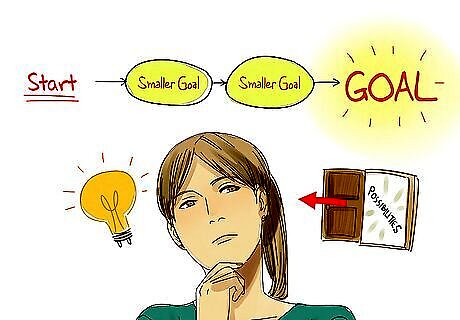
views
Identifying Your Weaknesses

List events with unfavorable outcomes in your life. As you go through life, some things will go the way you want and others won’t. Making a list of your failures or shortcomings can point you in the direction of your weaknesses. Write down anything in life that didn’t turn out the way you had hoped. For example, if you continuously fail to keep a relationship going for more than a few months, write that down.

Find common threads in these events. If your shortcomings have a common thread, this is a clear weakness. Now that you’ve identified that weakness you can start developing a strategy to work on it. When you overcome the weakness, there’s a better chance that your future outcomes will be what you want. For example, if you struggle to get along with family and coworkers, you might be weak in communication skills.

Ask for feedback. You might not always recognize your own weaknesses. Sometimes, it helps if you ask for feedback from people that know you well. Get the opinion of your boss, your spouse, or anyone else that you know well. Avoid becoming defensive when asking for feedback. Thank the other person for their honest advice, and they will be more likely to be open with you in the future.

Think of things you want to change in your life. If there are areas of life that make you unhappy, it may be because you feel weak or unsuited to handle those areas well. Make a note of such things and see if there is any correlation between your weaknesses and the changes you want to make. You will likely find that these changes all stem from an area that you are not well suited to handle. For example, if you wish your house was cleaner and your office was less cluttered, it isn’t a stretch to say that you might have a weakness in organization. Finding that weakness is the first step to overcoming it.
Redefining Your Weaknesses

Ask yourself how each weakness serves you. Your mind does not create weaknesses on purpose. These traits are created in an attempt to protect you or serve you in some way. The sooner you understand what that is, the sooner you can find a more positive way to cope with that situations, leaving no need for your current weakness. For example, a weakness in approaching strangers could stem from being taught that strangers are dangerous and that protecting yourself meant staying away from them. Remember that nobody can be perfect at everything. If you struggle with certain skills or subjects, consider your strengths instead. For example, you may not be good at math, but you can celebrate how good you are at writing.

Use your strengths to overcome a weakness. There are multiple ways to look at any task or situation. Instead of focusing on skills that you lack, try tackling tasks with the skills you do have. This can build your confidence and make you capable of doing more things that you thought possible. For example, if you are intimidated by math but great with computers, you can tackle budget related tasks by plugging everything into a spreadsheet and letting it do the math for you.

Rely on your network. Networking with others is a strength in any situation. Admitting that you need help in a certain area will help you to include team members and other partners in your tasks. You can also learn to overcome your weaknesses by observing how others tackle those tasks. If you find it difficult to reach out or to rely on others, this might be your weakness! You can take steps to learn how to depend on others.

Work towards strengthening your areas of weakness. You can take a class, workshop, or training to develop some skills. You could also seek out a mentor to help you grow as a person and overcome your weaknesses. You can also read a self-help book or online coaching materials. If your weaknesses are the result of emotional roots, you could even see a counselor to help you work through these underlying issues. A therapist or mental health professional can help you identify your patterns and habits so that you can make positive changes in your life.
Working Through Weaknesses

Develop a concise plan of action. Once your weaknesses are identified, you need a plan to beat them. Set goals for yourself with time limits. Under each goal, create actionable steps that allow you to stay on track and succeed. For example, if your public speaking skills are weak, make it a goal that you can give a confident presentation. You can plan out actionable steps like writing a speech, delivering the speech to an empty room, then to one person, then to several people. Eventually, you’ll be confident enough to deliver the speech to a public audience. Tell other people about your goals to make yourself accountable for them. You may even ask a trusted friend or mentor to be an accountability partner. They should check in every now and then to see how far you have progressed.

Utilize your strengths to build confidence. While you are working to overcome a weakness, work on things you are good at, too. This will keep your confidence up and help you get back to work overcoming the weaknesses. It also keeps you looking competent and skilled while you build your skillset even more. For example, if you are really good at writing speeches, you could help others write their speeches until you feel comfortable delivering your own.

Count every success. Your weaknesses are called weaknesses for a reason. It takes hard work and dedication to overcome them. Even if you fall short of a goal, acknowledge any progress that you did make. This will keep you in a positive frame of mind and help you pick up and continue overcoming the weakness. Even if you haven’t mastered the art of speaking to large crowds, give yourself credit when you speak up in a meeting or give a presentation to your colleagues. Celebrate all of your successes. You can do this by taking photographs to commemorate them, making social media posts, or going out to dinner with friends.




















Comments
0 comment